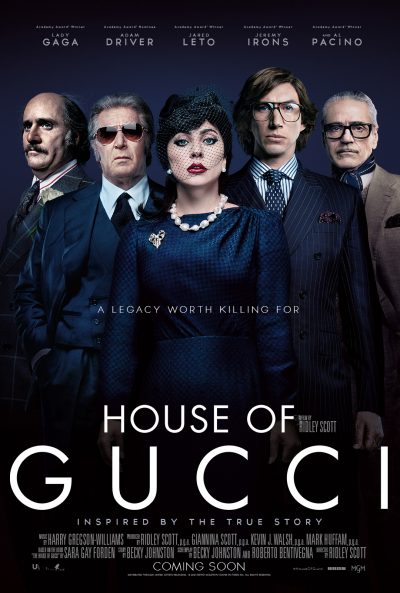
“House of Gucci” (2021). Cast: Lady Gaga, Adam Driver, Al Pacino, Jeremy Irons, Jared Leto, Jack Huston, Salma Hayek, Camille Cottin, Alexia Murray, Vincent Riotta, Youssef Kerkour. Director: Ridley Scott. Screenplay: Becky Johnston and Roberto Bentivegna. Story: Becky Johnston. Book: Sara Gay Forden, The House of Gucci: A Sensational Story of Murder, Madness, Glamour and Greed. Web site. Trailer.
Ambition is a dual-edged sword. On one hand, it can drive the fulfillment of tremendous noteworthy and beneficial accomplishments. On the other hand, however, it can get out of control when left unchecked, taking us places that are better left unexplored. Given that, then, we must ask ourselves, “What will it be – a path to achievement or a road to ruin?” That’s the central question raised in the pulpy, fact-based domestic drama, “House of Gucci.”
In 1978, Maurizio Gucci (Adam Driver) is about to become embroiled in a perilous scenario he never saw coming. The conservative, mild-mannered law student and one of the heirs to the family fortune of the House of Gucci, world-renowned Italian designers of high-end leather goods, clothing and accessories, goes about his life unassumingly, diligently pursuing his studies and dutifully attending to the needs of his widowed father, Rodolfo (Jeremy Irons), a onetime screen star and a largely silent partner in the family business. Everything seems to be going along fine until one fateful evening when Maurizio attends a party.
While at this glitzy, glamorous soiree, the reserved Maurizio mostly keeps to himself, but that all changes when he has a chance encounter with one of the guests, Patrizia Reggiani (Lady Gaga). She’s instantly smitten with Maurizio, especially when she learns he’s a Gucci. Even though the down-to-earth Maurizio is not especially self-absorbed with his pedigree and social status, Patrizia, an ambitious middle class social climber, is anxious to snag herself a designer beau while the opportunity presents itself. She subsequently pursues Maurizio with persistence, and he gradually yields to her charms, albeit much to his father’s dismay. Rodolfo has no problem with his son dating Patrizia, but he’s adamantly opposed to them marrying, looking upon her as an opportunistic gold digger, an assessment with which Maurizio, in a rare display of rebellious assertiveness, heartily disagrees. Rodolfo informs Maurizio that, if he marries Patrizia, he’ll cut off all ties with him, including those of a financial nature. Yet it’s a risk Maurizio is genuinely willing to take – and a setback that Patrizia realizes she’ll quietly have to work to overcome.

With no means of Gucci family support, Maurizio takes a job washing trucks in the transport company owned by Patrizia’s father, Fernando (Vincent Riotta). He seems relatively content to be working and able to modestly support his wife, but it’s not enough for Patrizia. She begins looking for ways for Maurizio to re-ingratiate himself within the Gucci empire, his father’s formal severance with him notwithstanding. And that opportunity comes when a Gucci family relative plans a trip to Italy.
Aldo Gucci (Al Pacino), Rodolfo’s gregarious brother and the active partner in the family business, has been living in New York for some time, managing the company’s affairs and overseeing its global expansion. But now, as he prepares to celebrate his birthday, he decides to return to his homeland to be with family for the event. He invites his nephew and his new bride to the party, despite Maurizio’s initial reluctance to attend. Aldo persists, however, saying he’s anxious to see them and to meet Patrizia for the first time, given that he was unable to attend their wedding. Aldo’s perseverance pays off, and he succeeds in convincing the newlyweds to join the festivities.
Aldo is instantly taken with Patrizia, and she piles on the charm to court the favor of Maurizio’s uncle, especially where the family business is concerned. Aldo discreetly tells Maurizio that he sees him as the future of the company, especially since the only other family member candidate is his son, Paolo (Jared Leto), a buffoonish would-be designer with unrealistic expectations and an inherent lack of talent, a point on which virtually all Gucci family members agree. But nailing down the particulars of that transition will take some doing. With both Rodolfo and Aldo aging and in declining health, and with a host of undisclosed financial issues threatening to surface, the likelihood of an orderly transfer of power (and money) is anything but certain. In fact, about the only certainty in all this is that Patrizia wants to steer events in a direction that clearly serves her and Maurizio – with an emphasis decidedly on her.

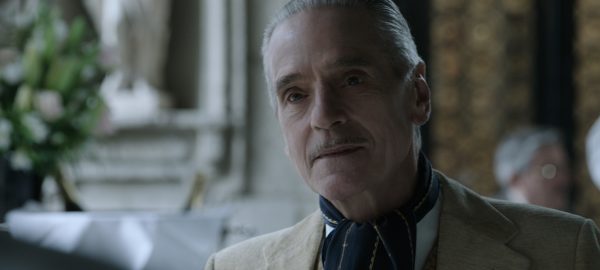
What ensues is a nasty power struggle to secure control of the Gucci fortunes, with Patrizia taking the lead in orchestrating the course of events, often manipulating Maurizio into decisions in which he has no say and that he’s subsequently left to clean up, actions that lead to his growing resentment toward her. Family infighting, the betrayal of trusted advisors and a search for outside investors to act as financial saviors all come into play, complicating matters at every turn. And, as the stakes are continually raised and circumstances grow progressively more dire, Patrizia becomes ever more desperate to look for the means to get her way, even going so far as to routinely consult a questionable TV psychic, Pina Auriemma (Salma Hayek), for advice that, conveniently and coincidentally, nearly always reflects exactly what she wants to hear (and that sometimes veers way outside of an advisory capacity). What’s more, as Patrizia’s efforts at manipulation and coercion continue to heat up, Maurizio distances himself even further from her, a development that accelerates when he runs into an old flame, Paola Franchi (Camille Cottin), while on a visit to Switzerland. The alienation of affections involved in this only serves to pour fuel onto an already-smoldering fire, one whose consequences carry calamitous implications for all involved.
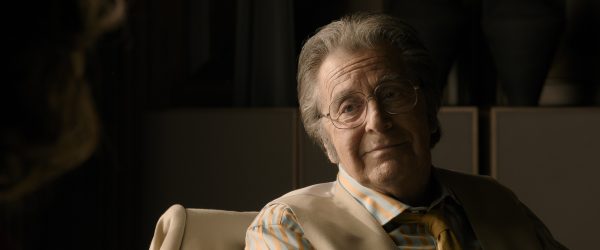
Getting ahead in life is certainly a laudable pursuit, but how far are we willing to go to attain that goal? Ultimately, it varies for each of us, depending on what beliefs we hold, particularly when it comes to how we view matters of ambition. Some see it as a positive impelling force. But others use it to justify self-serving behavior, a course of action that can leave a trail of carnage in its wake if not properly reined in. In the end, we have to ask ourselves, “Which will it be?”
Determinations like this are important in the formation and adoption of our beliefs, for they play a crucial role in shaping the reality we experience, a product of the conscious creation process, the philosophy that maintains we draw upon these intangible resources in manifesting the existence we experience. This, of course, takes into account the totality of our world, including not only our own considerations, but also those of others around us. And, if our ambition-based beliefs get out of control, somebody could get hurt – and not just us.
This is at the heart of the story in “House of Gucci,” and we see characters who reflect an array of possible attitudes toward ambition. Maurizio, for example, is contented to get ahead but not at the price of having to step over bodies to do so, at least when it comes to his own volition. However, when he’s backed into a corner and questions of self-preservation come into play, the changed circumstances bring about changes in beliefs – and outcomes – driven by how prior events unfolded. Of course, he might not have had to make those adjustments if he had taken steps to avoid them (more on that below), but, as we’re all aware, desperate times often produce comparable responses.
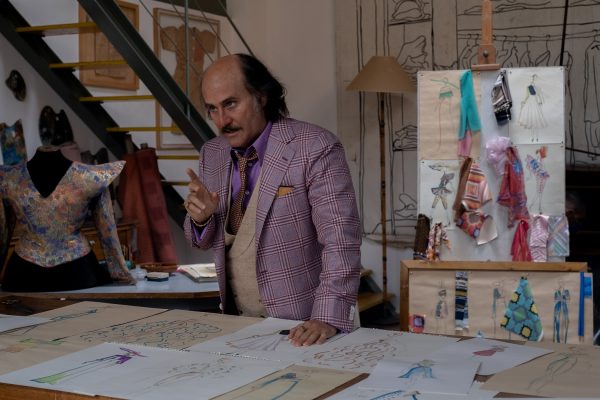
By contrast, Patrizia is a textbook example of ambition run amok. She wants what she wants, and she’ll do virtually anything to attain it. And that, in turn, calls for ruthless, hardnosed beliefs to make that happen. From the time she first meets Maurizio, she’s willing to do whatever it takes to get her hooks into the Gucci empire and everything that comes with it. She’s so driven, in fact, that one could argue Machiavelli might have had her in mind when he penned The Prince, even though her motivations were focused more on economics than politics. Nevertheless, in pursuing her objectives, she invokes the same absolutist attitude that tyrants have employed throughout history.
In taking this stance, Patrizia practices un-conscious creation, a variation on the philosophy’s basic premise that pursues the realization of one’s goals at all costs, regardless of whatever fallout might arise. The problem with this is that it often produces unintended side effects, as one’s manifestations often materialize in distorted forms, sometimes grotesquely so. This leaves new problems to clean up, often necessitating new desperate measures that take the creator further away from realizing the intended outcome. And, as the film illustrates, what a mess than can yield.
In watching this train wreck unfold, viewers might wonder, “Could any of this have been avoided?” Well, the obvious answer is yes. Patrizia, for instance, could have altered her belief outlook to one that was ambitious but considerably more benign. Just as importantly, though, those around her could have taken steps to ameliorate the situation. Maurizio and other Gucci family members, for example, could have proactively moved to avoid giving away their personal power. But, since they didn’t, they allowed the in-law to intervene and take charge, manipulating situations to her advantage and leaving themselves open to the problems that resulted. And, by that point, circumstances backed them into corners where they often needed to respond in kind, practicing their own forms of un-conscious creation just to try to keep up with what was transpiring around them.
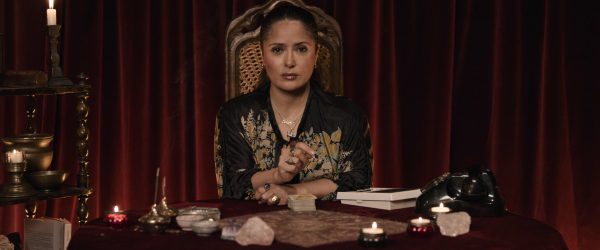
No matter how we go about creating our existence, we must always bear in mind that our beliefs and subsequent materializations are our responsibility as their creators. In particular, we must never lose sight of the fact that what we create always carries consequences, for better or worse. When things work out well, those consequences are obviously positive and often beneficial. However, when things go awry, the consequences can be dire, even deadly. And that, in turn, can open an entirely new can of worms, one that may be next to impossible to properly reseal. Taken in its totality, then, “House of Gucci” is a powerful cautionary tale that plays out on a classic morality play stage, one whose message comes across loud and clear and applies to all manner of situations, not just the attempted takeover of a world-renowned leather goods empire.
Viewers should be aware, though, that this film is not all deadly seriousness. When it comes to director Ridley Scott’s latest, those going in expecting high drama are going to be sorely, sorely disappointed. However, those craving a hefty serving of high camp will be positively delighted. This tawdry, wickedly funny account of the pulpy soap opera behind control of the famous (or is it infamous?) family-owned Italian fashion empire puts even the best episodes of Dynasty to shame. It’s virtually impossible to take any of this overly seriously, which is what I believe the filmmaker was going for here, despite those who mistakenly might believe to the contrary. With superb, over-the-top performances by Lady Gaga, Pacino, Leto and Irons, coupled with extravagant production design excesses at every turn and a suitably fitting period piece soundtrack, this deliciously guilty pleasure of a film entertains throughout, even at a somewhat overlong (but nevertheless well-paced) two-and-a-half hour runtime. I was pleasantly surprised by this one, especially given the erroneous, off-the-mark advance reviews of it. In fact, I came away from the film rhetorically asking myself, “Who knew Ridley Scott had such a sense of humor!” Indeed, if you aren’t tickled by this one, then it’s obvious you’re just no fun. The picture is currently playing in theaters.
We’re all well aware (or at least should be) that we reap what we sow, and that applies across the board from acts of charity to unspeakable atrocities. As a consequence, we should be eminently careful in what we choose to undertake, no matter how strong the temptation might be to willfully line our own pockets. That’s especially true from the standpoint of doing so at any cost. Indeed, all that glitters may not be worth the price, particularly when the cost is higher than any of Gucci’s famous creations. Letting ambition get the best of us could well be a trap from which there’s no escape – and no return.
Copyright © 2021, by Brent Marchant. All rights reserved.

No comments:
Post a Comment